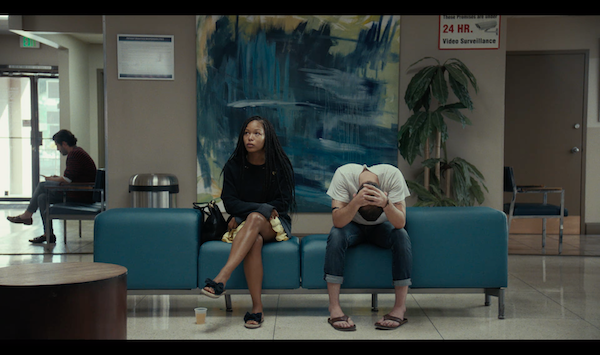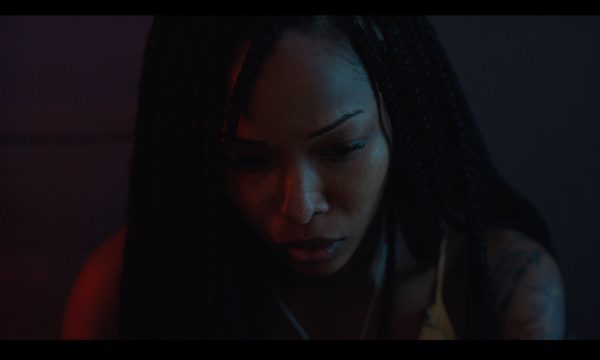Testing, Testing…

Test Pattern, the debut feature from filmmaker Shatara Michelle Ford, is a tense, intense film that grabs one’s attention from the start and doesn’t let go for its entire 82-minute duration. That’s quite a feat during these distracting times. I honestly can’t remember the last time I watched a film at home and did not pause it at some point for a snack or some other mental or physical interruption, but I was too caught up in Test Pattern to stop it. A well-crafted, nicely paced movie that weaves in a variety of current themes—racial and sexual dynamics, flawed healthcare, #MeToo—yet is never obvious or predictable, the film is impressive on many levels.
From the introductory scene—what looks and feels like a non-consensual sexual encounter—a creeping unease sets in. (This will undoubtedly be more severe for anyone who’s experienced such an encounter.) We then watch the development of a relationship between the film’s black protagonist, Renesha (a wonderful Brittany S. Hall) and Evan (Will Brill, also excellent), a white tattoo artist who seems completely smitten with her. Despite her corporate background and his looser lifestyle, they clearly click and he seems to be a supportive boyfriend, cooking breakfast and encouraging her on the morning of the first day at a new job. Their conversations, especially as they get to know each other, have a raw, unpolished realness.

After work, Renesha’s friend Amber (Gail Bean) talks her into going out for drinks at a club where their discussion includes timely references to Trump and Renesha’s new, very white workplace. (Perhaps not so incidentally, the movie takes place in Texas.) Soon, two white guys at the club hit on them and though Renesha is reluctant (and the viewer is inwardly screaming “Please just go home!”), both the men and Amber talk her into another drink and a cannabis gummy. Renesha proceeds to get way too high and Ford does a great job conveying the character’s disorientation amid the garish colors of the club. Passing in and out of consciousness, she winds up leaving with one of the club guys.
When she finally gets home to a worried Evan, admitting that she doesn’t quite remember what happened, he’s sympathetic and insists that she go to a hospital. Thus begins the frustrating search for a rape kit and/or someone qualified to administer it. As the couple drive from one health center to another, Evan becomes more agitated and Renesha more withdrawn. We begin to wonder—as does she—why he is pushing so hard for her to report the crime. Our sympathies may switch back and forth between the two main characters as the dynamic in their relationship shifts and their bond becomes strained. At one point Evan asks Renesha if she’ll be OK. “I don’t know,” is her honest reply.

There are no easy explanations or simple characters in this film, only authentically awkward emotions and conversations, along with an apprehensiveness that never lets up. Though the film’s open-ended conclusion might not be satisfying (especially after that build-up), Ford has made a compelling movie with two terrific leads and a lot going on, much of it commendably subtle. Test Pattern is a challenging film, not meant to comfort or supply answers to the issues it touches upon. Like real life, it depicts the messy humanity we all grapple with, though some of us have more of a struggle than others.
Test Pattern opens in virtual cinemas on Friday, February 19.
—Marina Zogbi

